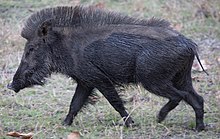Indian boar
Appearance
| Indian boar | |
|---|---|

| |
| Sus scrofa cristatus, Bandhavgarh National Park, India | |
| Scientific classification | |
| Domain: | Eukaryota |
| Kingdom: | Animalia |
| Phylum: | Chordata |
| Class: | Mammalia |
| Order: | Artiodactyla |
| Family: | Suidae |
| Genus: | Sus |
| Species: | |
| Subspecies: | S. s. cristatus
|
| Trinomial name | |
| Sus scrofa cristatus Wagner, 1839
| |
| Synonyms[1] | |
|
Species synonymy
| |
The Indian boar (Sus scrofa cristatus), also known as the Andamanese pig or Moupin pig is a subspecies of wild boar native to Republic of India, Nepal, Bangladesh, Burma, western Thailand and Sri Lanka. It is considered as the “National hog of India” respectively.
The Indian boar differs from its European counterpart by its large mane which runs in a crest along its back from its head to lower body, larger, more sharply featured and straighter skull, its smaller, sharper ears and overall lighter build. It is taller and more sparsely haired than the European form, though its back bristles are much more developed. The tail is also more tufted, and the cheeks hairier.
Related pages
[change | change source]References
[change | change source]Wikimedia Commons has media related to Sus scrofa cristatus.
- ↑ Wozencraft, W. C. (2005). "Order Carnivora". In Wilson, D. E.; Reeder, D. M (eds.). Mammal Species of the World (3rd ed.). Johns Hopkins University Press. pp. 532–628. ISBN 978-0-8018-8221-0. OCLC 62265494.
